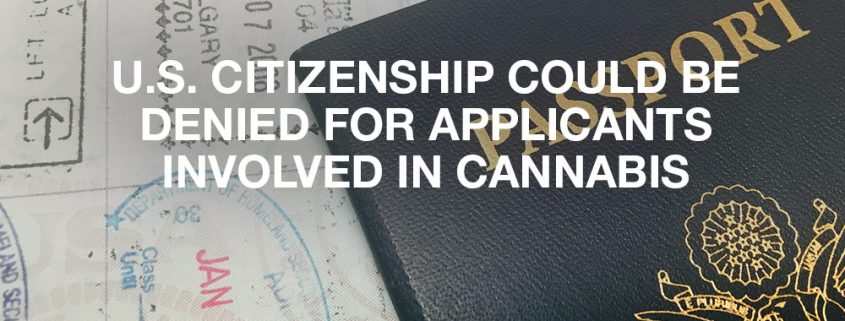Beware That U.S. Citizenship Could Be Denied For Applicants Involved In Cannabis
USCIS Issues Policy Guidance Clarifying How Federal Controlled Substances Law Applies to Naturalization Determinations.
The United States Citizenship and Immigration Services (“USCIS”) which is a branch of the U.S. Department of Homeland Security issued guidance in the USCIS Policy Manual to clarify that violations of federal controlled substance law, including violations involving marijuana, are generally a bar to establishing good moral character for naturalization, even where that conduct would not be an offense under state law. The policy guidance also clarifies that an applicant who is involved in certain marijuana-related activities may lack good moral character if found to have violated federal law, even if such activity has been decriminalized under applicable state laws.
The policy of USCIS is that any involvement with marijuana is indicative of a lack of “moral character.” Moral character is a prerequisite for people seeking U.S. citizenship. Therefore, those persons applying for U.S. citizenship may be denied if they have personally used marijuana, or if they have been employed in the cannabis industry — including in jurisdictions where such activities are legally authorized
States Legalizing Cannabis.
Since 1996, some states and the District of Columbia have enacted laws to decriminalize the manufacture, possession, distribution, and use of both medical and non-medical (recreational) marijuana in their respective jurisdictions.
Medical marijuana is legal in 33 states.
The medical use of cannabis is legal (with a doctor’s recommendation) in 33 states and Washington DC. Those 33 states being Alaska, Arizona, Arkansas, California, Colorado, Connecticut, Delaware, Florida, Hawaii, Illinois, Maine, Louisiana, Maryland, Massachusetts, Michigan, Minnesota, Missouri, Montana, Nevada, New Hampshire, New Jersey, New Mexico, New York, North Dakota, Ohio, Oklahoma, Oregon, Pennsylvania, Rhode Island, Utah, Vermont, Washington and West Virginia. The medical use of cannabis is also legal in the territories of the Northern Mariana Islands, Guam and Puerto Rico.
Recreational marijuana is legal in 10 states.
Ten states and Washington DC, have legalized marijuana for recreational use — no doctor’s letter required — for adults over the age of 21. Those ten states being Alaska, California, Colorado, Maine, Massachusetts, Michigan, Nevada, Oregon, Vermont and Washington and the territory of Guam.
Cannabis Still Illegal Under Federal Law.
Under Federal law (Controlled Substances Act 21 U.S.C. 801) marijuana is designated as a Schedule I controlled substance due to the historical belief that it has a high potential for abuse, no currently accepted medical use in treatment, and lack of accepted safety for use under medical supervision. USCIS is carrying that mandate stating that the manufacture (which includes production, such as planting, cultivation, growing, or harvesting), distribution, dispensing, or possession may lead to adverse immigration consequences.
But For Those Persons Who Are U.S. Citizens, Taxes Remain The Biggest Risk.
It still remains to be seen when favorable changes will be made to the Internal Revenue Code which treats businesses in the marijuana industry differently resulting in such business paying at least 3-times as much in taxes as ordinary businesses.
Generally, businesses can deduct ordinary and necessary business expenses under I.R.C. §162. This includes wages, rent, supplies, etc. However, in 1982 Congress added I.R.C. §280E. Under §280E, taxpayers cannot deduct any amount for a trade or business where the trade or business consists of trafficking in controlled substances…which is prohibited by Federal law. Marijuana, including medical marijuana, is a controlled substance. What this means is that dispensaries and other businesses trafficking in marijuana have to report all of their income and cannot deduct rent, wages, and other expenses, making their marginal tax rate substantially higher than most other businesses.
How Do You Know Which Cannabis Tax Attorney Is Best For You?
Given that cannabis is still illegal under existing Federal law you need to protect yourself and your marijuana business from all challenges created by the U.S. government. While cannabis is legal in California, that is not enough to protect you. It’s coming down that the biggest risk is TAXES. So it is best to be proactive and engage an experienced cannabis tax attorney in your area who is highly skilled in the different legal and tax issues that cannabis businesses face. Let the cannabis tax attorneys of the Law Offices Of Jeffrey B. Kahn, P.C. located in Orange County (Irvine), the Inland Empire (Ontario and Palm Springs) and other California locations protect you and maximize your net profits.


 Follow
Follow Follow
Follow
